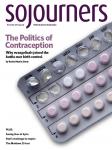LAST NOVEMBER, when my daughter turned 2 weeks old, I returned to full-time work. Five days after her birth I was on email. Within a week I was taking work calls. I wasn’t a workaholic. I was a new mom without paid family leave.
Several years earlier, when I was single and singularly focused on my career, I’d been hired as a contractor for the United Methodist Church to direct a grassroots campaign on maternal health. I never stopped to consider what effect my employment status might have if I decided to have a child of my own. When my husband and I got pregnant, I faced the stark reality that there were no policies in place to protect or support me.
Sadly, my experience is commonplace. A recent report revealed that one in four U.S. women return to work within two weeks of giving birth. While the Family and Medical Leave Act (FMLA) protects employees’ jobs for up to 12 weeks after the birth or adoption of a child, only about 60 percent of U.S. workers meet the eligibility requirements, including only 19 percent of new moms. And since the FMLA does not require employers to provide paid leave, those who are eligible and need time off do not always take it because they cannot afford the loss of income.
With no federal paid-family-leave program and only a handful of states with their own, churches and other employers that do provide paid parental leave are left to foot the bill for it. Oftentimes they offer this benefit exclusively to their highest earners. The United Methodist Church, for example, does have a national parental-leave policy of up to 12 paid weeks, but it is only available to pastors. Staff of the denomination’s agencies, such as the one I work for, are offered up to 18 days of paid leave, after which they must use accumulated vacation or sick days or take unpaid leave. But as a lay person and a contractor, I was not eligible for either policy.
Before I had my daughter, I was optimistic about my return to work soon after her birth. I pictured scenes of my infant sleeping soundly in her bassinet while I responded to emails and wrote reports from home. The reality was otherwise. I distinctly remember bursting into tears during a conference call about maternal health when my daughter began to cry and needed to nurse. As I held the phone in one hand and my daughter in the other, I couldn’t resolve the tension of advocating for other moms while not having adequate time to care for my own infant daughter or myself.
Currently, paid family leave is a perk for a privileged few, but the faith community can be a leader in changing this. Churches and faith-based organizations that currently lack a policy should be proactive in forming one. Baptist Women in Ministry (bwim.info) have several examples from which to work. Some amount of parental leave should be available to all employees, including men, part-time staff, and hourly workers—and ideally it should be paid leave, at least partially. Faith communities can continue to support parents as they return to work by including provisions for flexible hours, reduced hours at full pay, or accommodations for home-based work.
As people of faith we are called to recognize that we bring our full selves to our work, including our relationships that need nurturing and care. Providing family leave is a prophetic act that honors God as we love our neighbors—and their families—as ourselves.

Got something to say about what you're reading? We value your feedback!

